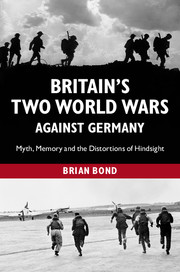Book contents
- Frontmatter
- Contents
- Acknowledgements
- Introduction
- 1 The creation of myths after 1945
- 2 British policy and strategy
- 3 British generalship in the two world wars
- 4 At the sharp end: combat experience in the two world wars
- 5 Attrition in the First World War: the naval blockade
- 6 Attrition in the Second World War: The strategic bombing of Germany
- 7 The transformation of war on the Western Front, 1914–1918
- 8 The British Army’s learning process in the Second World War
- 9 After the wars: Britain’s gains and losses
- Appendix
- Select bibliography
- Index
- References
1 - The creation of myths after 1945
Published online by Cambridge University Press: 05 October 2014
- Frontmatter
- Contents
- Acknowledgements
- Introduction
- 1 The creation of myths after 1945
- 2 British policy and strategy
- 3 British generalship in the two world wars
- 4 At the sharp end: combat experience in the two world wars
- 5 Attrition in the First World War: the naval blockade
- 6 Attrition in the Second World War: The strategic bombing of Germany
- 7 The transformation of war on the Western Front, 1914–1918
- 8 The British Army’s learning process in the Second World War
- 9 After the wars: Britain’s gains and losses
- Appendix
- Select bibliography
- Index
- References
Summary
In Britain in 1945 victory was greeted with relief rather than euphoria. Living conditions remained harsh and an ‘Age of Austerity’ was dawning. It would soon become clear that although Britain had emerged on the winning side she was markedly in decline as a world power and her Empire was breaking up. Nevertheless Britain’s role in the Second World War continued to be viewed in a very patriotic light in sharp contrast to the First World War, whose negative attributes were ever more grimly emphasised.
As the editors of a two-volume study entitled The Great War, 1914–1945 remarked, ‘The First World War has more often than not been regarded as a “bad” war resulting from failures in diplomacy, and a war characterised by the “futile” sacrifices of trench warfare on the Western Front; standing in stark contrast to the justifiable and necessary struggle, between 1939 and 1945, against Nazi tyranny and Japanese militarism’. One of the contributors neatly summarised the contrasting myths of the two world wars: ‘The First World War was not really about anything, or not about anything important; the Second World War was about national survival at home and defeat of a vile tyranny abroad’. Moreover, whereas the earlier war had been hopelessly mismanaged by incompetent generals, their successors had been technically proficient and had avoided heavy casualties by conducting mobile wars of manoeuvre.
- Type
- Chapter
- Information
- Britain's Two World Wars against GermanyMyth, Memory and the Distortions of Hindsight, pp. 8 - 24Publisher: Cambridge University PressPrint publication year: 2014



